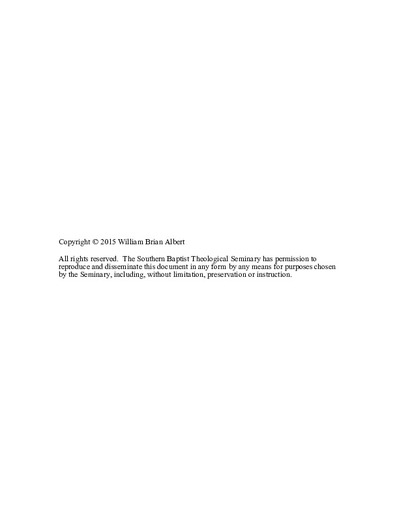"When the wind blows cold": the spirituality of suffering and depression in the life and ministry of Charles Spurgeon
Subject
Spurgeon, C. H. Charles Haddon), 1834-1892Suffering--Religious aspects--Christianity
Depression--Religious aspects--Christianity
Abstract
ABSTRACT
“WHEN THE WIND BLOWS COLD”: THE SPIRITUALITY OF SUFFERING AND DEPRESSION IN THE LIFE AND MINISTRY OF CHARLES SPURGEON
William Brian Albert, Ph.D.
The Southern Baptist Theological Seminary, 2015 Chair: Dr. Donald S. Whitney
This dissertation examines the spirituality of suffering and depression in the life and ministry of Charles Spurgeon. Chapter one frames the dissertation by presenting general facts concerning Spurgeon’s depression and the relationship that his depression has to his spirituality.
Chapter 2 emphasizes particular facts and features of Spurgeon’s life and ministry that demonstrate his depression. This section places Spurgeon within the historical context of the nineteenth century, and especially within significant movements and events that established the setting for his depression.
Chapter 3 features specific aspects of Spurgeon’s personality that influenced his depression and further document that he was in fact a depressed man. This section highlights certain dangers based on Spurgeon’s proclivity toward despondency.
Chapter 4 highlights specific causes in Spurgeon’s depression. Specific focus is on physical, mental, circumstantial, ministerial, and other elements that contributed to his depression. A section on Spurgeon’s theological tension within this depression is also discussed.
Chapter 5 discusses Spurgeon’s theology as it relates to his suffering and depression. For Spurgeon, a Trinitarian and Calvinistic doctrine was paramount in dealing with depression. These teachings would frame his understanding of man and
human conduct both in life of the believer and unbeliever. The chapter also demonstrates Spurgeon’s understanding of church history within the context of a suffering faith.
Chapter 6 examines the cures for Spurgeon’s physical and mental depression. Spurgeon had no aversion to medicine and doctors in assisting his physical maladies and depression. Diet, rest, exercise, the weather and the sea were all factors that aided in temporary recovery of Spurgeon when depressed.
Chapter 7 explores the range of spiritual disciplines that Spurgeon practiced himself and which he encouraged other Christians to perform to maintain a vital experience of communion with God during times of depression. Spurgeon believed that means such as meditation of Scripture, prayer, service and the sacraments were essential practices for maintaining genuine Christian piety.
Chapter 8 summarizes answers given to the research question and related questions. This section also provides concluding reflections and recommended further research on this topic.

